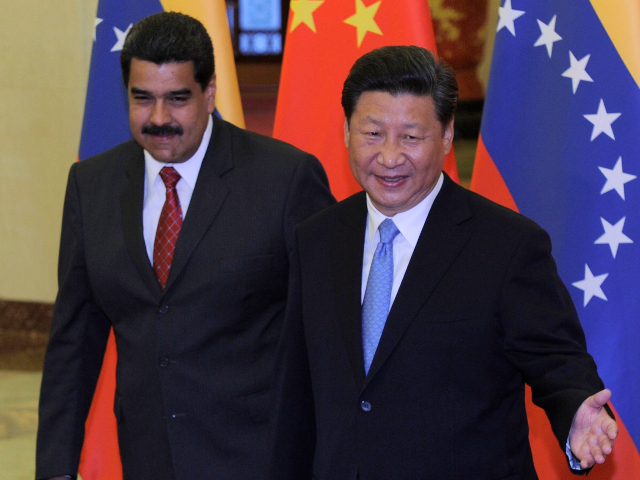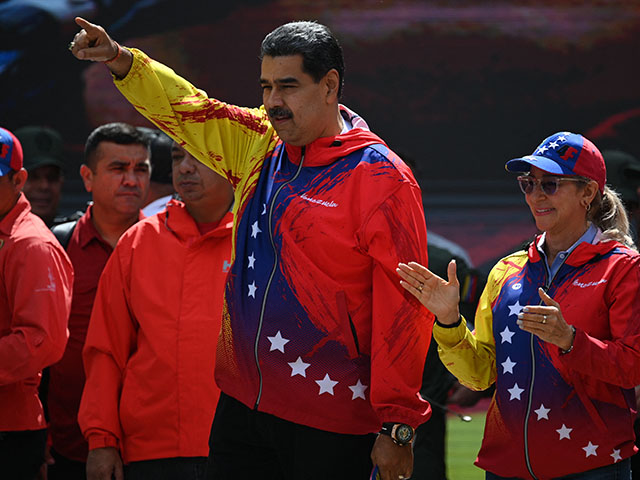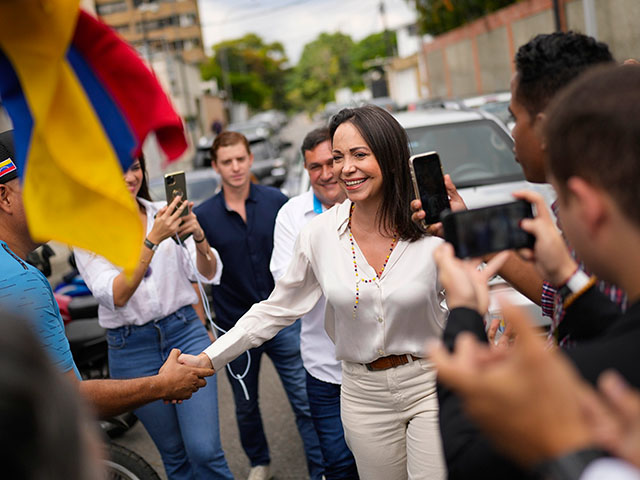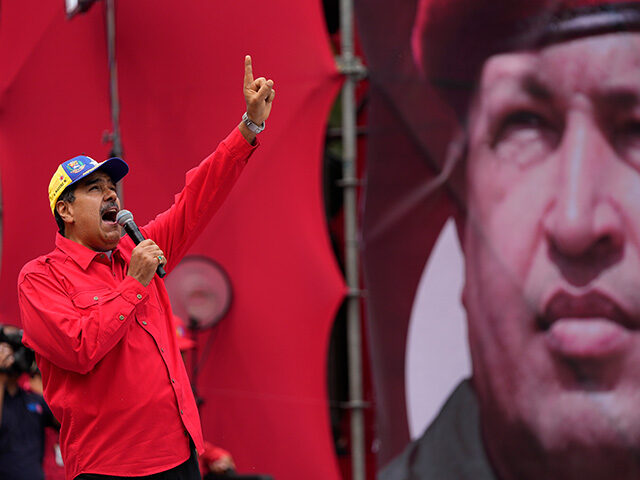Venezuela’s National Electoral Center (CNE), controlled entirely by the ruling socialist regime, announced on Tuesday that the South American country will hold its next sham presidential election on July 28 — the date of late dictator Hugo Chávez’s birthday.
The rushed electoral calendar presented by CNE facilitates the fraudulent “reelection” of socialist dictator Nicolás Maduro, who is seeking a third six-year term. María Corina Machado — the opposition’s candidate and, polls show, a frontrunner against Maduro in the race — remains banned from running for public office through 2030, leaving only little-known and unpopular “opposition” candidates to compete.
In addition to the sham election’s date, CNE’s head Elvis Amoroso announced that, if required, Venezuelans will have between March 18 to April 16 to update their voter registry information for the “election.” Prospective candidates not banned by the socialist-controlled institutions have between March 21-25 to present their candidacies. The presidential campaign will last between from July 5 through the 25th and voting will take place on July 28.
#EnVIVO| Elvis Amoroso, presidente del CNE, indicó que se fijó la fecha de elecciones presidencial "el día 28 de julio del presente año”.
Conéctate a nuestra señal #EnVivo aquí: https://t.co/6wxTIBWMgC pic.twitter.com/kqIOKvnPnW
— VPItv (@VPITV) March 5, 2024
Prior to leading Venezuela’s top electoral authority, Amoroso ratified Machado’s ban in 2023 during his tenure as Venezuela’s Comptroller General.
The schedule of the upcoming sham presidential election was released less than a week after the Maduro regime and several collaborationist groups signed a new agreement for a “free and fair” 2024 presidential election. The agreement, according to the rogue socialist regime, replaces an October 2023 agreement signed in Barbados between the Maduro regime and members of Venezuela’s Unitary Platform “opposition” coalition under the observation of the administration of U.S. President Joe Biden and Secretary of State Antony Blinken.
The “Barbados agreement,” which the Maduro regime repeatedly violated during its brief term in vigor, required of both parties’ commitment to a set of vague promises to participate in and host a “free and fair” presidential election sometime during the second half of 2024. No date was publicly given for the agreement’s hypothetical election.
In return for its promise, the Maduro regime received from President Joe Biden an ample oil and gas sanctions relief package that allows Venezuela to freely sell its oil in U.S. and international markets such as China and India. The sanctions relief was enacted despite the fact that neither Maduro nor any member of his socialist regime ever made any indication that they took the Barbados commitments seriously.

Chinese President Xi Jinping meets with Venezuela’s President Nicolas Maduro at the Great Hall of the People on September 1, 2015, in Beijing, China. (Parker Song-Pool/Getty Images)
Although last week’s “Caracas agreement” suggested 27 possible days for the election, the regime chose dates — March 5 and July 28 — that coincidentally carry weight in the socialist regime’s pseudo-religious structure. March 5 marks the anniversary of the death of Maduro’s predecessor, late dictator Hugh Chávez, whom the regime posthumously elevated to the made-up rank of “Supreme and Eternal Commander of the Revolution,” while July 28 marks Chávez’s birthday.
The Maduro regime celebrates Chávez’s birthday and death date as holidays in an effort to mimic Venezuela’s traditional commemorations of the birthday and death of independence hero Simón Bolívar, who was born on July 24, 1783, and died on December 17, 1830.
Jorge Rodríguez, head of the Venezuelan National Assembly, claimed on Tuesday that CNE’s sham election schedule is “in compliance” with the Barbados agreement, as the upcoming sham election will be held in the second half of 2024.

Venezuelan President Nicolas Maduro (C) and First Lady Cilia Flores (R) greet supporters during a rally to commemorate 20 years of the anti-imperialist declaration of the late former President Hugo Chavez in Caracas on February 29, 2024. (FEDERICO PARRA/AFP via Getty Images)
Dictator Maduro celebrated CNE’s sham election announcement on social media, describing the electoral authority’s schedule as a “sacred word.”
“Sacred Word, the Electoral Power has spoken. It has summoned us for July 28, the day of the Presidential elections,” Maduro’s message read. “Let us go forward for the love of Venezuela, the Bolivarian Revolution and the love of our Eternal Commander Hugo Chávez. Let us go to battle and let us win!”
Palabra Sagrada, habló el Poder Electoral… nos ha convocado para el 28 de julio, día de las elecciones Presidenciales. Sigamos adelante por amor a Venezuela, a la Revolución Bolivariana y al amor de nuestro Comandante Eterno Hugo Chávez. ¡Vamos a la batalla y vamos a ganar!
— Nicolás Maduro (@NicolasMaduro) March 5, 2024
Machado reacted to the announcement as she was conducting a campaign event in the state of Barinas, urging her sympathizers to remain serene and firm. Machado has continued to campaign despite it being illegal for her to hold any political office.
“Today, given what has happened, that they intend to disregard the rights of Venezuelans, listen to me well, serenity and firmness,” Machado said during her Tuesday campaign event. “This is what is coming, and more work than ever.”
Machado reiterated that she received a mandate as a result of her overwhelming victory in last year’s opposition primary elections, in which she received over 90 percent of the votes. Machado asserted that such a mandate means to go “to the very end,” adding that the entire world is demanding Maduro allow an actual free and fair election.
Yo recibí un mandato. El mandato de conducir a este país a unas elecciones limpias y libres. Yo estoy comprometida a llegar hasta el final con esto.
Así como se salieron de la negociación, ahora se quieren salir de la ruta electoral porque tienen miedo.
Mi compromiso es… pic.twitter.com/ep48VVyUGd
— María Corina Machado (@MariaCorinaYA) March 5, 2024
The Maduro regime claims that the self-organized opposition primary election was fraudulent and the socialist-led courts declared it “null and void.” The socialist regime also kidnapped several of Machado’s campaign administrators, and socialist thugs have violently assaulted participants at some of Machado’s past campaign events.
Despite her existing ban, Machado has ruled out the possibility of having someone substitute for her on the ballot. CNE’s announcement only gives Machado and the Venezuelan “opposition” less than three weeks to decide on any possible candidates in the event Machado does end up deciding to endorse a replacement or a third candidate.
Maduro was first elected president of Venezuela in April 2013 for a six-year term as a result of a snap emergency election following Chávez’s death in March 2013. At the time, Maduro narrowly defeated Capriles Radonski by a 1.49-percent margin in a heavily contested election marred with thousands of documented irregularities. While Capriles initially fiercely contested the election, he ultimately stopped contesting them.

Supporters greet opposition presidential hopeful Maria Corina Machado as she arrives at a polling station to cast her ballot during the opposition primary election in Caracas, Venezuela, on October 22, 2023. (AP Photo/Matias Delacroix)
In 2018, as the collapse of socialism hit rock bottom in Venezuela, Maduro clung to power and secured a new six-year term for himself by holding a sham election in which only Maduro and a small group of handpicked “rivals” were able to participate.
The highly fraudulent election and Maduro’s refusal to step down led the then-opposition-led National Assembly to act in accordance with what the Venezuelan constitution describes as a “rupture in the democratic order,” appointing Juan Guaidó, who was the head of the federal lawmaking body at the time, as interim president in January 2019.
Guaidó’s designation led to a constitutional crisis, with both him and Maduro contesting the Venezuelan presidency. Guaidó never managed to exert any power in the country and his interim legitimate presidency failed to remove Maduro. Guaidó’s presidency was dissolved by the opposition-led National Assembly in December 2022, nearly four years after its establishment, leaving Maduro’s rule unchallenged. Guaidó, and the now-ousted opposition lawmakers, now live in exile.
Christian K. Caruzo is a Venezuelan writer and documents life under socialism. You can follow him on Twitter here.

COMMENTS
Please let us know if you're having issues with commenting.